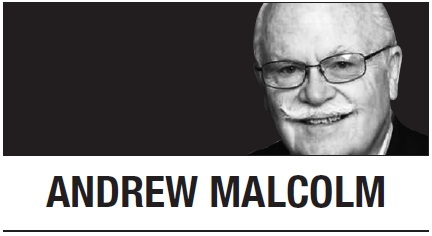[Andrew Malcolm] Kim offer to meet proves Trump right to stand firm in Asia
By Korea HeraldPublished : March 15, 2018 - 17:53
 Here’s an exquisite potential irony for you: The most bellicose president of modern times negotiates nuclear detente on the Korean Peninsula after his soft-power predecessor violently ousts Libya’s government but keeps his Nobel Peace Prize.
Here’s an exquisite potential irony for you: The most bellicose president of modern times negotiates nuclear detente on the Korean Peninsula after his soft-power predecessor violently ousts Libya’s government but keeps his Nobel Peace Prize.But let’s not put the peace parade before the warhead. The invitation to meet President Donald Trump from North Korea’s ruthless dictator Kim Jong-un and the offer to suspend his nuclear weapons testing is a welcome step.
Certainly better than a launch countdown. That’s all.
Through a string of US presidencies, the communist regime under three successive Kims has offered, made and broken more deals than Harry Reid. Like brutal father like brutal son. It’s been a game with that crowd that executes rivals with artillery pieces and lethal sprays.
Give Trump credit for not being the naive nationalist many charged. It’s no coincidence that this sudden offer by Kim comes 14 months into the first term of a president who promised to crush the Islamic State jihadist group quickly, then unleashed the US military to do just that within the year.
The same president warned Syria against using poison gas. When the regime ignored that, within 48 hours the new commander-in-chief ordered cruise missiles to demolish much of the launching base.
It was a shocking shift from Barack Obama’s apologies and erasable red lines that everyone came to understand were enforced by mere words. As bullies sometimes do, Kim seems to have gotten the tougher message, heightened by strict ongoing global enforcement of even more stringent economic sanctions. Never forget, however, the North has not kept any agreement yet.
To add some rhetorical condiments to his assault on the North’s existential nuclear threat, Trump tossed out promises of “fire and fury” should Kim attack the US or its allies. He warned the United Nations that Kim was on a suicide mission if he continued. And Trump tossed in some derision about “Little Rocket Man.”
This, of course, set off all the critical hand-wringers who wouldn’t believe that the man Americans elected to disrupt business as usual was actually going to disrupt diplomacy as usual.
Remember, during the transition, when Trump took a congratulatory phone call from the Taiwan government before talking with Beijing? That protocol fracture right there told mainland China this guy was different.
Campaigning Trump often said US foreign policy needed more unpredictability to keep potential adversaries off-balance. Of course, this made many establishment types uncomfortable. That’s not how things are done. And how’s that business as usual worked out with North Korea’s rampant weapons development?
Beyond words, Trump authorized enhanced joint exercises with South Korean and Japanese forces, beefed up missile defenses and sent not one but two massive carrier strike forces to that Pacific neighborhood.
I spent some years in Asia and saw firsthand how uncomfortable Americans are throwing their acknowledged weight around. We want to be liked, to be reasonable. So, we hold back and then when too provoked, often overreact.
But here’s the deal: In Asian cultures that comes across as weak. There is no shame there in being mighty and acting mighty. Did China ask permission to build strategic artificial islands in the South China Sea? There is shame -- and weakness -- in being seen to not use your power.
Remember China’s refrain that the US is a “paper tiger”? Japan’s prewar politicians believed the same. In the weeks before Pearl Harbor, Adm. Isoroku Yamamoto, who studied several years at Harvard, warned ministers their target was a “sleeping giant.”
“For a while we’ll have everything our own way,” the attack leader wrote prophetically, “stretching out in every direction like an octopus spreading its tentacles. But it’ll last for a year and a half at the most.” Exactly 18 months later, American codebreakers intercepted Yamamoto’s flight plans and the son of a samurai went down in flames.
Trump says national security and avoiding surprise attacks are his top responsibility. Look for complications and preconditions to erupt even before any Kim talks from either side. Where they’ll be. When they’ll be. What they’ll discuss.
Given the years, money and prestige that dictator family has invested in nuclear weapons and intercontinental ballistic missiles, it seems patently impossible Kim would genuinely relinquish them. Especially recalling what the previous US president helped happen to Libya’s Gadhafi after he did.
More likely, Kim will stall, seek to sow dissension among allied leadership. Indeed, division is how Japan ruled Korea as a split colony starting in 1910. Russia kept the division in 1945. The 1953 cease-fire (still no peace treaty) set it in barbed wire and minefields.
Unification of the peninsula resides as a profound dream in the heart of every Korean. Kim’s grandfather tried it by force 68 years ago this June in a surprise attack across the 38th Parallel where Kim No. 3 and Trump may meet this spring.
Perhaps wishfully, the first Kim misinterpreted vague Truman administration statements appearing to suggest the Korean Peninsula was outside the sphere of postwar US interest.
Of course, no real results are guaranteed. But this time Trump’s unorthodox bravado and boldness, backed by real military might, have made US interests in Korea more than clear -- so far.
Andrew Malcolm
Andrew Malcolm is an author and veteran national and foreign correspondent covering politics since the 1960s. -- Ed.
(Tribune Content Agency)
-
Articles by Korea Herald








![[Kim Seong-kon] Democracy and the future of South Korea](http://res.heraldm.com/phpwas/restmb_idxmake.php?idx=644&simg=/content/image/2024/04/16/20240416050802_0.jpg&u=)








![[KH Explains] Hyundai's full hybrid edge to pay off amid slow transition to pure EVs](http://res.heraldm.com/phpwas/restmb_idxmake.php?idx=652&simg=/content/image/2024/04/18/20240418050645_0.jpg&u=20240418181020)

![[Today’s K-pop] Zico drops snippet of collaboration with Jennie](http://res.heraldm.com/phpwas/restmb_idxmake.php?idx=642&simg=/content/image/2024/04/18/20240418050702_0.jpg&u=)